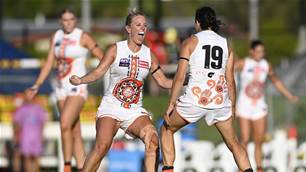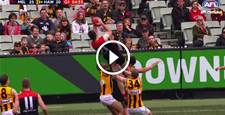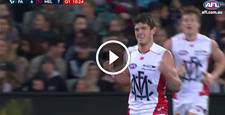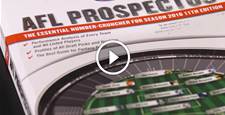Is there a more recognisable face in Australian sport than Ron Barassi’s?
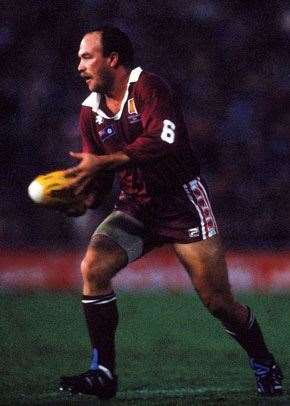 Ron Barassi in all his glory for the Demons in 1964.
Ron Barassi in all his glory for the Demons in 1964.Images: Getty Images
As a kid, I could see that you were very energetic and dynamic. You even seemed like an angry person on the field. I could see you were a bloke who made up his own mind about what happened to a game, regardless of what the other 35 blokes on the field thought. What drove you?
I’ve got the sort of face that, if I’m looking deadly serious, it looks to have a touch of anger in it. It makes it easy to say, “Oh, he’s angry”, but I hadn’t been. Mind you, I certainly did get angry a few times. Maybe a few hundred times. Some people might say a few thousand ...
I remember at Preston Tech, in a cross-country run. I won it the year before, and being a year older, you start further back. I passed this young guy who had a professional trainer with him. Unheard of then. The kid said to his coach, “Barassi’s going like a rocket. What do I do?” And the trainer said, “Don’t worry about it. He won’t last the distance.” Well, I can remember even now, I thought, “Mmm. You won’t get past me, mate.” I had had that natural challenging outlook on life that made it more enjoyable for me. Again, I don’t know where that came from.
There’s a saying that’s ten words, and each word is only two letters, but it’s powerful: “If it is to be, it is up to me.” No matter what you read, or what you’ve been told, what instructions you’ve read, it doesn’t matter. In the end, you have to go and act on it. You have to go and do it. That makes everyone the most important person in their world. Not the world, their world. I don’t think enough people get hold of that truth.
You’ve seen dynasties come and go. You must have learnt a lot from that.
Footy is one of the biggest team games in the world, in size. You’ve got 18 blokes on the field. Unless the administration’s on the ball, you’ll never have a long run of success. People will say, “Come on, Ron, what about the players on grand final day?” Well, of course it’s up to them, but who makes them perform? It’s the coaches. Who chooses thecoaches? Who chooses the medicos? Who gets the money rolling in so you can afford the extra little things for players? Who runs the group? That’s where success comes from. Wherever there’s a group of people trying to do things, they have to unite, get the best out of each other. All that stuff. Because of the rules today, it’s hard to stay on top, stay strong.
As a football lover, I’d rather it was that way than have a Melbourne dominate like they used to. That sort of thing’s probably impossible now. A club might come along one day with players of gigantic ability who are happy as hell – once or twice every 100 years. Even Geelong gradually got together an off-the-field team, a secretary, coach ... But the last man in the link these days is the football manager, and they got that bloke from Richmond, Neil Balme. Apparently he’s made a big difference. Now the coach is gone, the president’s gone. But the other thing is that a grand final is bloody hard to win. Things can go wrong on the day.
As a coach you were meticulous about the details. You were hard on skill deficits. Now the game is what you wanted it to become. You don’t have those random elements any more. You’re not going to get a Crosswell, Kekovich or Blight kicking the wrong way occasionally, but being brilliant the rest of the time. It’s affected the game as a spectacle.
Yes, well, you have waves of players all doing the right thing now because of drilling, not judgment. There’s not enough high-marking, not much long kicking, not much one-one-one. There’s hardly any duelling, and that’s so interesting: “Who’s gonna win?” It makes a game more interesting.
I’ve always been concerned about the future of our game. When I was 25 or 26 I was talking to a mate, Ian Johnson, who was secretary of the MCC, and said I was thinking of going full-time into football, because I was worried about the opposition from soccer and that sort of stuff, and he said, “Now Ronnie, what you’re talking about may be right, but don’t ruin your life.”
A few years later, Sheeds convinced his club, Richmond, who were sailing along very nicely, to let him go out and promote football at schools and junior levels – you had your own zones in those days – so it was going to reverberate successfully for Richmond. Naturally I thought, “Geez, I would have jumped on that.” He’s a man of vision.
We’re the only country in the world with six types of football, four going well: the two rugbys, Aussie rules and soccer. Most countries only have one doing well. America has all types of football, but none doing well, except gridiron. It’s a worry. I think in 50 or 100 years, we’ll have two or three doing well. I don’t want us to be the one that drops out. Look, it might be that rugby league and union join back together into a new game. But it mightn’t happen because of that social divide between the two.
Related Articles
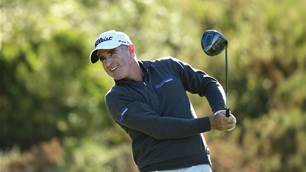
Video interview: Drinks With ... Matt Millar
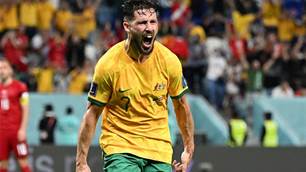
Socceroo star's message to kids: Don't be an AFL player
